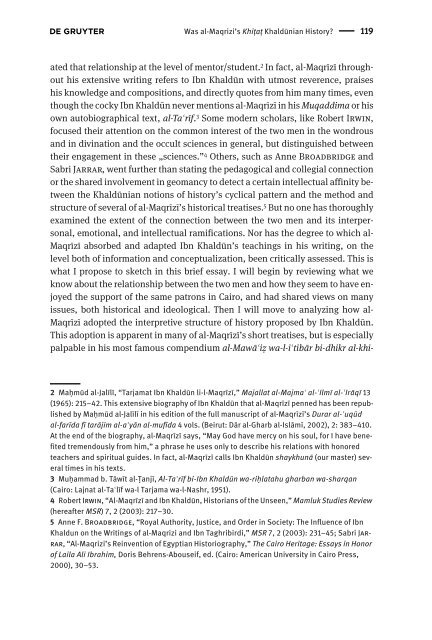0021-1818_islam_98-1-2-i-259
0021-1818_islam_98-1-2-i-259
0021-1818_islam_98-1-2-i-259
You also want an ePaper? Increase the reach of your titles
YUMPU automatically turns print PDFs into web optimized ePapers that Google loves.
Was al-Maqrizi’s Khitat Khaldunian History? 119<br />
ated that relationship at the level of mentor/student. 2 In fact, al-Maqr\z\ throughout<br />
his extensive writing refers to Ibn Khaldun with utmost reverence, praises<br />
his knowledge and compositions, and directly quotes from him many times, even<br />
though the cocky Ibn Khaldun never mentions al-Maqr\z\ in his Muqaddima or his<br />
own autobiographical text, al-Ta^rif. 3 Some modern scholars, like Robert Irwin,<br />
focused their attention on the common interest of the two men in the wondrous<br />
and in divination and the occult sciences in general, but distinguished between<br />
their engagement in these „sciences.” 4 Others, such as Anne Broadbridge and<br />
Sabri Jarrar, went further than stating the pedagogical and collegial connection<br />
or the shared involvement in geomancy to detect a certain intellectual affinity between<br />
the Khaldunian notions of history’s cyclical pattern and the method and<br />
structure of several of al-Maqr\z\’s historical treatises. 5 But no one has thoroughly<br />
examined the extent of the connection between the two men and its interpersonal,<br />
emotional, and intellectual ramifications. Nor has the degree to which al-<br />
Maqr\z\ absorbed and adapted Ibn Khaldun’s teachings in his writing, on the<br />
level both of information and conceptualization, been critically assessed. This is<br />
what I propose to sketch in this brief essay. I will begin by reviewing what we<br />
know about the relationship between the two men and how they seem to have enjoyed<br />
the support of the same patrons in Cairo, and had shared views on many<br />
issues, both historical and ideological. Then I will move to analyzing how al-<br />
Maqr\z\ adopted the interpretive structure of history proposed by Ibn Khaldun.<br />
This adoption is apparent in many of al-Maqr\z\’s short treatises, but is especially<br />
palpable in his most famous compendium al-Mawa^iz wa-l-i^tibar bi-dhikr al-khi-<br />
2 Ma1mud al-Jal\l\, “Tarjamat Ibn Khaldun li-l-Maqr\z\,” Majallat al-Majma^ al-^Ilmi al-^Iraqi 13<br />
(1965): 215–42. This extensive biography of Ibn Khaldun that al-Maqr\z\ penned has been republished<br />
by Ma1mud al-Jal\l\ in his edition of the full manuscript of al-Maqr\z\’s Durar al-^uqud<br />
al-farida fi tarajim al-a^yan al-mufida 4 vols. (Beirut: Dar al-Gharb al-Islam\, 2002), 2: 383–410.<br />
At the end of the biography, al-Maqr\z\ says, “May God have mercy on his soul, for I have benefited<br />
tremendously from him,” a phrase he uses only to describe his relations with honored<br />
teachers and spiritual guides. In fact, al-Maqr\z\ calls Ibn Khaldun shaykhuna (our master) several<br />
times in his texts.<br />
3 Mu1ammad b. Taw\t al-Tanj\, Al-Ta^rif bi-Ibn Khaldun wa-rihlatahu gharban wa-sharqan<br />
(Cairo: Lajnat al-Ta^l\f wa-l Tarjama wa-l-Nashr, 1951).<br />
4 Robert Irwin, “Al-Maqr\z\ and Ibn Khaldun, Historians of the Unseen,” Mamluk Studies Review<br />
(hereafter MSR) 7, 2 (2003): 217–30.<br />
5 Anne F. Broadbridge, “Royal Authority, Justice, and Order in Society: The Influence of Ibn<br />
Khaldun on the Writings of al-Maqrizi and Ibn Taghribirdi,” MSR 7, 2 (2003): 231–45; Sabri Jarrar,<br />
“Al-Maqrizi’s Reinvention of Egyptian Historiography,” The Cairo Heritage: Essays in Honor<br />
of Laila Ali Ibrahim, Doris Behrens-Abouseif, ed. (Cairo: American University in Cairo Press,<br />
2000), 30–53.


